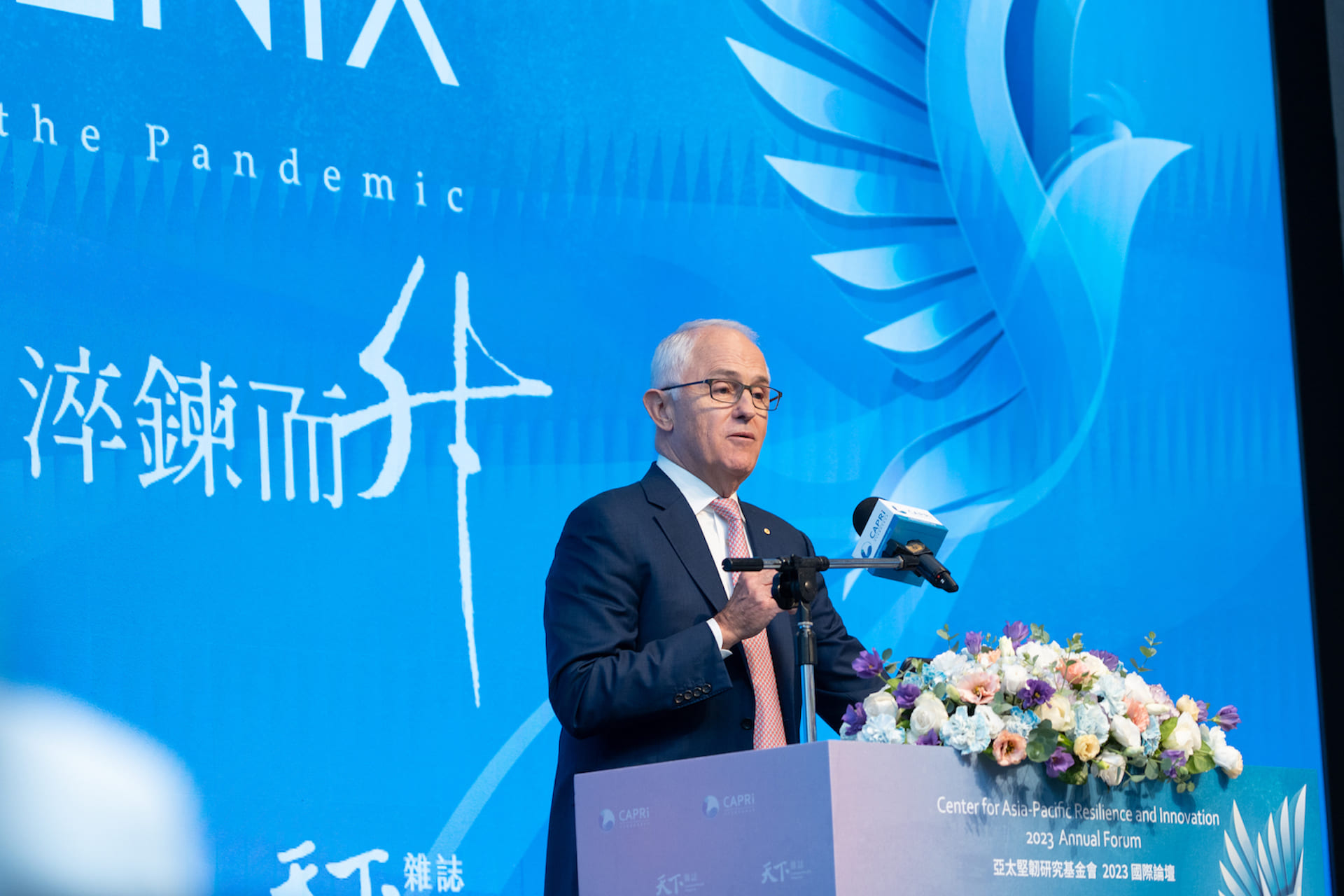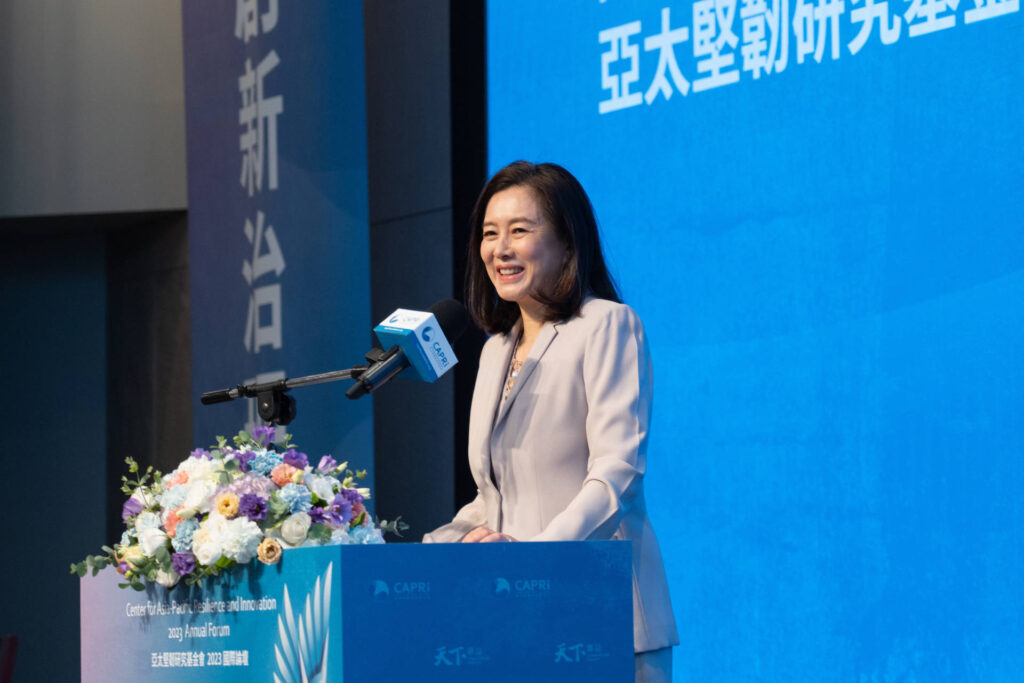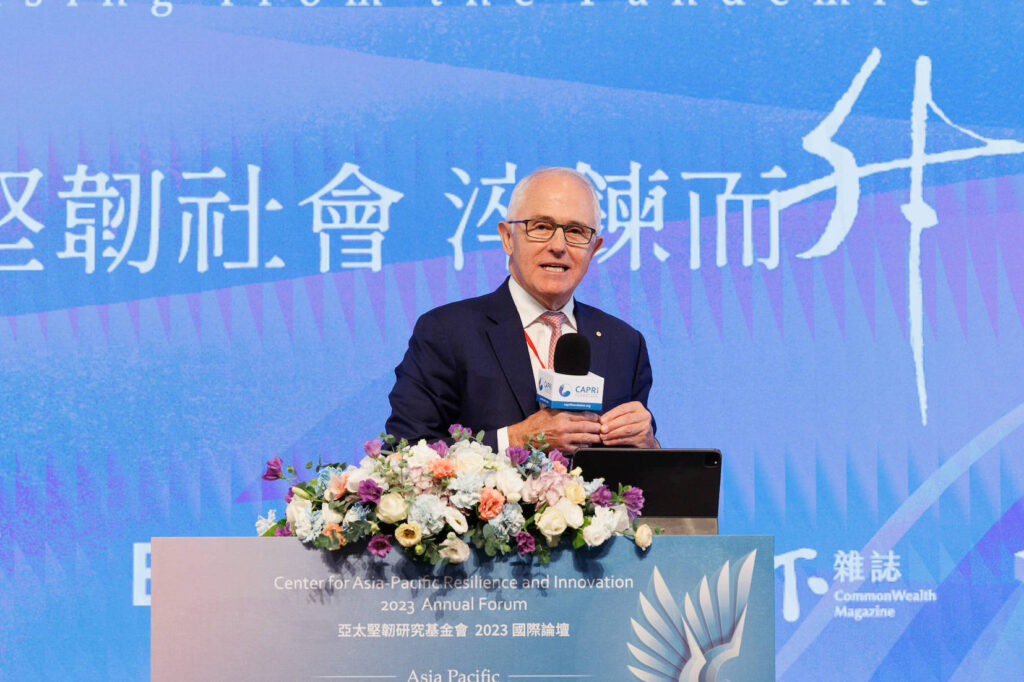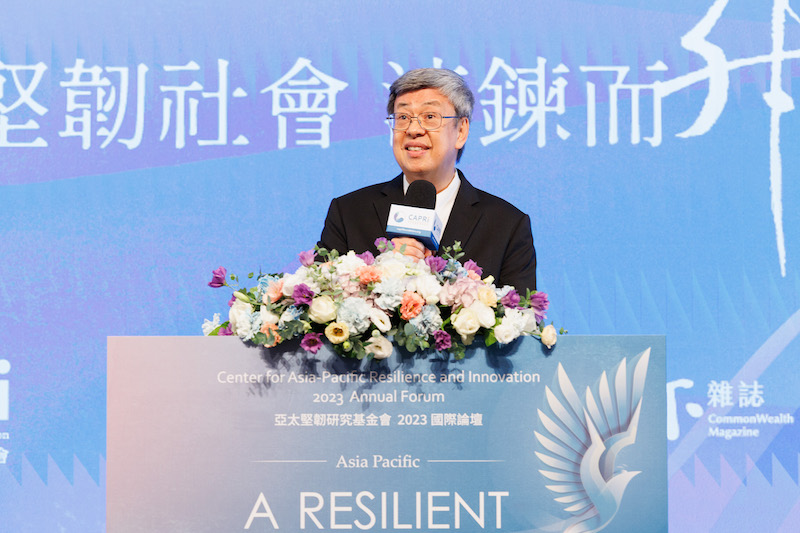

Three years after the world was first shaken by the COVID-19 pandemic, governments, businesses, and the public are attempting a return to normalcy. As a post-pandemic mindset takes hold in policy communities, the Asia Pacific region is poised to contribute to these efforts by sharing its successes, failures, and learnings across public health, economic dynamism, talent circulation, and sustainable growth. What lessons does the region hold for policymakers striving to build a more resilient and inclusive post-pandemic world? In CAPRI’s 2023 Annual Forum, members from CAPRI’s International Advisory Council and board, key stakeholders in the region’s policy community, and contributors to CAPRI’s ongoing research will discuss pressing challenges to resilience and solutions as the Asia Pacific emerges from this latest crisis and prepares for future ones.


The rise of authoritarian regimes and the spread of divisive populism have tested the resilience of liberal democracy, said Malcolm Turnbull, chair of CAPRI’s International Advisory Council. However, recent events have shown that democratic unity and support are more critical than ever. Vladimir Putin’s invasion of Ukraine, far from achieving his goals, has galvanized Ukrainian nationalism and strengthened NATO. The lesson is clear: democracies must stand together and support one another. Yet, the greatest threats to democracy may lie within. Disinformation is rampant, and the media landscape has been transformed, with social media platforms and media silos contributing to division and anger. We must defend truth, correct lies, and flood the zone with facts. Additionally, resilient institutions and electoral systems are vital for effective democracy, citing some of Australia’s successes. Together, we can navigate these turbulent times and build a brighter future.
Achieving resilience requires mobilizing the whole of society. How can think tanks shape policy and promote resilience? Prof. Harding, a member of CAPRI’s board, highlighted the changes that have occurred in American think tanks, from changing research agendas and modes of communicating research to changing ideological and political identities of organizations. Speaking from her experience with several think tanks including Bruegel, Prof. García Herrero, also a CAPRI board member, discussed the value chain of think tanks transforming technical research into policy ideas that people can understand. Finally, Mr. Joshi, as chair of the Observer Research Foundation (ORF) in India, spoke about ORF’s founding mandate to manage political divergence and build consensus by bringing together diverse voices. For an organization like CAPRI, the panelists highlighted opportunities to develop regional dialogue, build a model of independence, and research topics that are most relevant today, with Dean Berse concluding that “if it’s not difficult, then it’s not worth doing.”
The climate crisis will have far-reaching effects on human health and health systems. In this last panel of the day, Prof. Heymann emphasized the One Health approach to preventing and monitoring for new diseases, considering the environment, plant and animal agriculture, and human health together. Speaking on the challenges Taiwan faces in climate and health, Prof. Tsai identified changes in temperatures and rainfall that lead to health concerns, including heat stroke, cardiovascular diseases, and changes in patterns of infectious disease, and water- and food-borne diseases. Sir Collin Tukuitonga discussed the Pacific Island countries’ experience with climate change and health, pointing out that while sea level rise and extreme weather are popular topics in the international media, more urgent challenges for people on the islands include ocean acidification and warming. Dr. Khor discussed how different government units within a health ministry can integrate priorities for health security, universal health coverage, health promotion, climate change, and One Health through public administration changes and shared funding mechanisms.


The rise of authoritarian regimes and the spread of divisive populism have tested the resilience of liberal democracy, said Malcolm Turnbull, chair of CAPRI’s International Advisory Council. However, recent events have shown that democratic unity and support are more critical than ever. Vladimir Putin’s invasion of Ukraine, far from achieving his goals, has galvanized Ukrainian nationalism and strengthened NATO. The lesson is clear: democracies must stand together and support one another. Yet, the greatest threats to democracy may lie within. Disinformation is rampant, and the media landscape has been transformed, with social media platforms and media silos contributing to division and anger. We must defend truth, correct lies, and flood the zone with facts. Additionally, resilient institutions and electoral systems are vital for effective democracy, citing some of Australia’s successes. Together, we can navigate these turbulent times and build a brighter future.
Achieving resilience requires mobilizing the whole of society. How can think tanks shape policy and promote resilience? Prof. Harding, a member of CAPRI’s board, highlighted the changes that have occurred in American think tanks, from changing research agendas and modes of communicating research to changing ideological and political identities of organizations. Speaking from her experience with several think tanks including Bruegel, Prof. García Herrero, also a CAPRI board member, discussed the value chain of think tanks transforming technical research into policy ideas that people can understand. Finally, Mr. Joshi, as chair of the Observer Research Foundation (ORF) in India, spoke about ORF’s founding mandate to manage political divergence and build consensus by bringing together diverse voices. For an organization like CAPRI, the panelists highlighted opportunities to develop regional dialogue, build a model of independence, and research topics that are most relevant today, with Dean Berse concluding that “if it’s not difficult, then it’s not worth doing.”
Why are resilient health systems integral to maintaining a healthy economy? Prof. Kang, a CAPRI senior fellow at Ehwa Womans University in Seoul, highlighted that resilient health systems are better prepared to detect and respond to health threats and can foster confidence and trust in institutions. Prof. Yeoh, a member of CAPRI’s International Advisory Council, spoke from his varied careers to discuss the resilience of Hong Kong’s health system, noting that a shift is needed to focus on the individual wellness of people who contribute their resources and labor to the economy. CAPRI Council member Prof. Teo spoke about Singapore’s experience in learning from previous epidemics to build economic safety nets in case of an outbreak and coordinate across government agencies. Prof. Riley, a CAPRI Council member at the University of Virginia, spoke about the US experience of the pandemic, highlighting the need for cross-cultural communication between institutions. Across jurisdictions, the panelists highlighted common themes: of equity, trust in institutions, and the economic cost-benefit analysis of selecting health policies.
In a region where the IT and high-tech industries have grown in the past two decades, what does the future of talent circulation look like for companies as well as educators? Stan Shih introduced the topic by speaking on the core values of the “new Wangdao” philosophy of leadership, namely value creation, balance of different interests, and sustainable development. He then discussed how he applied the philosophy in his leadership of Acer and in his retirement to contribute to society. The panelists then discussed the roles of both educational institutions and companies in addressing the worldwide shortage of talent. Mr. Lim identified a worldwide education funding deficit that contributes to talent shortages today, highlighting the need for continuing education to foster lifelong learning and innovation. As people work in more different careers and enter industries that did not previously exist, Steve Mull discussed the role of American universities in preparing students with the skills needed to navigate their future careers, engage with the world, and acquire new knowledge after leaving school. Ms. Ng discussed how TSMC considers talent pipelining across functions and geographies to upgrade talent early in people’s careers.
The climate crisis will have far-reaching effects on human health and health systems. In this last panel of the day, Prof. Heymann emphasized the One Health approach to preventing and monitoring for new diseases, considering the environment, plant and animal agriculture, and human health together. Speaking on the challenges Taiwan faces in climate and health, Prof. Tsai identified changes in temperatures and rainfall that lead to health concerns, including heat stroke, cardiovascular diseases, and changes in patterns of infectious disease, and water- and food-borne diseases. Sir Collin Tukuitonga discussed the Pacific Island countries’ experience with climate change and health, pointing out that while sea level rise and extreme weather are popular topics in the international media, more urgent challenges for people on the islands include ocean acidification and warming. Dr. Khor discussed how different government units within a health ministry can integrate priorities for health security, universal health coverage, health promotion, climate change, and One Health through public administration changes and shared funding mechanisms.
At the end of the forum, Prof. Syaru Shirley Lin introduced Premier Chen Chien-Jen. As a board member of CAPRI’s partner the Reform for Resilience Commission, Premier Chen supported and advised CAPRI prior to its founding until he reentered politics in 2022. The Premier delivered remarks on national resilience in the context of Taiwan. Afterwards, Malcolm Turnbull closed the forum with remarks on the importance of resilience. “Instead of trying to turn back the waves, we’ve got to be good surfers,” said Turnbull. “They see a big wave coming and can figure out how to catch and ride it to the beach.”
It is my great pleasure to be in Taiwan for CAPRI’s inaugural Annual Forum. Having lived, studied, and worked across the world, remarkably this is my first time visiting this island, and I am incredibly grateful to Syaru Shirley Lin, CAPRI’s Chair, for the invitation to join you today.
The past three years have increased international attention on Taiwan, partly because of geopolitics, but also because of its effective handling of the COVID-19 pandemic. Like the rest of the world, Taiwan could not fully avoid the virus but demonstrated that pandemic management is possible with effective public health measures. Most striking has been the level of collaboration here, where the public’s trust in their government is rewarded with open and transparent decision making that brings in different groups. This model for multilateral cooperation should be replicated worldwide.
Beyond COVID, the next great challenge the world faces is the rise of authoritarian, populist, protectionist regimes. It was only through the sharing of information and technology across borders that we could manage COVID, so reversing this progress would be a considerable regression. Rather than looking to the US or Europe for cues, democratic leaders of the Asia Pacific must build a collaborative ecosystem that guards the peaceful relations that have enabled our region’s extraordinary economic growth over the last 50 years and ensures its future prosperity. With Japan and India hosting the G7 and G20 meetings, 2023 is a unique year for Asian countries to assert themselves on the international stage.
With this in mind, I am delighted to see CAPRI’s ambition for building networks across the Asia Pacific and promoting the best the region has to offer across the world. This Annual Forum is a fantastic opportunity to recognize the work CAPRI is doing to share thinking from the region, connecting countries and organizations with shared ambitions for an equitable and sustainable future.

Malcolm Turnbull
Chair of the CAPRI International Advisory Council;
Former Prime Minister of Australia (2015–2018)
Welcome to CAPRI’s inaugural Annual Forum. In celebration of our first anniversary, we are proud to showcase the unique platform that we have built for connecting global thought leadership and highlight how the Asia Pacific can emerge from the pandemic more innovative and resilient moving forward.
The COVID-19 pandemic created an unprecedented crisis worldwide, affecting physical and mental health and disrupting the global economy. It revealed the failure of multilateral organizations to provide solutions that restore resilience. More than ever, different sectors, communities, and countries must work together to understand and manage these complex issues. CAPRI was founded out of this crisis with the belief that a resilient future must rely on good governance and innovative public policy, grounded in evidence-based research and cross-border cooperation.
As an epicenter of many global challenges in public policy, from the continued effects of economic crises and the climate emergency to the multidimensional issue of population aging, Asia-Pacific societies have much to learn and share with each other and the world. Innovative thinking, cross-sector collaboration, and the simultaneous consideration of problems that have typically been studied separately are the tenets upon which CAPRI was founded one year ago. Just as the phoenix from Greek mythology is reborn from its own ashes, CAPRI aims to enable the region and the world to come back stronger and better prepared for future challenges.
Establishing an international, nongovernmental think tank in Taipei presented challenges at every turn; we quickly learned that we were not only setting up one of the first INGOs to be headquartered in Taiwan but also addressing a need for research that connects sectors, disciplines, and experts across the globe. I am thankful for the support of CAPRI’s donors, board members, International Advisory Council, staff, and network of partners around the world for their commitment to our mission, enabling us to promote innovative governance for years to come.

Syaru Shirley Lin
Chair